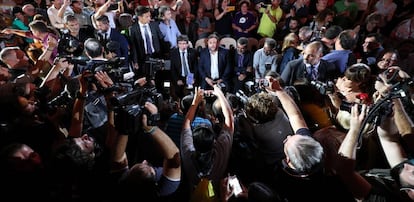Reporters Without Borders warns of harassment of journalists in Catalonia
Group condemns “insults, intimidation and threats” against media that oppose independence for region


In “a suffocating climate” of unprecedented harassment created by the independence movement, journalists are being abused and threatened online, according to Reporters Without Borders (RSF), an international non-profit organization that defends press freedom and promotes a safe working environment for journalists around the world.
“The continual pressure from the regional government on the local and foreign press, the abuse from pro-independence hooligans on social networks against critical journalists and the intimidating behavior from crowds of demonstrators against TV reporters has created a toxic atmosphere working against press freedom,” says the organization.
In its determination to get across its version of events, the regional government has crossed a red line Pauline Adès-Mevel, RSF
The RSF published the report just three days before the independence referendum in Catalonia – declared illegal by Madrid and suspended and Spain’s Constitutional Court.
Pauline Adès-Mevel, head of RSF’s EU-Balkans desk, described freedom of the press in Catalonia as “tremendously compromised by the extreme polarization of Catalonia’s politics and society,” adding, “the determination of the regional government to get across its version of events to the local, Spanish and international media has crossed a red line, and the threatening maneuvers of the central Spanish government haven’t helped.”
The brunt of the abuse is directed at local journalists critical of the independence movement and the RSF cites cases involving a number of EL PAÍS reporters. Cristian Segura was accused by the the Catalan left-wing, pro-independence CUP party of “sowing hatred” and Brussels correspondent Claudi Pérez, was ticked off by the regional government’s foreign communications department for publishing “uncomfortable truths” about those in favor of independence.
As soon as you tweet an article, either your own or someone else’s, you have the whole world on your back Bea Navarro, journalist
In a bid to influence the foreign press, the regional government was toying with the idea of creating a group of pro-independence foreign reporters. “I have had access to a document by people in charge of communications that included a list of foreign correspondents in Spain and comments such as ‘sensitive to the Catalan issue’ or ‘very critical of independence’,” says Henry de Laguérie, correspondent for France’s Europe1 Radio – a practice more appropriate to totalitarian regimes than democracy, as RSF points out.
“Everything is more aggressive and unpleasant on social networks,” says de Laguérie. “But particularly (the debate around) independence because it’s an emotional issue and the press war, particularly the one waged in the foreign press, is considered crucial.”
Singling out journalists for abuse by cyber-hooligans is also prevalent in Brussels, according to the RSF. The possibility that Catalonia might be left out of the EU should it win independence is a thorny issue for the Catalan regional government, which at times has resorted to killing the messenger.
The brunt of the abuse is directed at local journalists critical of the independence movement
This withering tweet was directed, for example, at Bea Navarro, journalist with La Vanguardia: “What Juncker says and thinks is what Bea Navarro says that he says and thinks.”
According to Navarro, “As soon as you tweet an article, either your own or someone else’s, you have the whole world on your back, especially independence supporters but also people who are strongly against it. And they are equally unpleasant.”
“If you are on Twitter or another social network, dialogue with readers or followers is part of the deal, but it has to be carried out in a polite and respectful way,” Navarro added.
English version by Heather Galloway.
Tu suscripción se está usando en otro dispositivo
¿Quieres añadir otro usuario a tu suscripción?
Si continúas leyendo en este dispositivo, no se podrá leer en el otro.
FlechaTu suscripción se está usando en otro dispositivo y solo puedes acceder a EL PAÍS desde un dispositivo a la vez.
Si quieres compartir tu cuenta, cambia tu suscripción a la modalidad Premium, así podrás añadir otro usuario. Cada uno accederá con su propia cuenta de email, lo que os permitirá personalizar vuestra experiencia en EL PAÍS.
¿Tienes una suscripción de empresa? Accede aquí para contratar más cuentas.
En el caso de no saber quién está usando tu cuenta, te recomendamos cambiar tu contraseña aquí.
Si decides continuar compartiendo tu cuenta, este mensaje se mostrará en tu dispositivo y en el de la otra persona que está usando tu cuenta de forma indefinida, afectando a tu experiencia de lectura. Puedes consultar aquí los términos y condiciones de la suscripción digital.








































